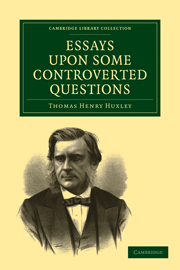Book contents
- Frontmatter
- Contents
- Dedication
- PROLOGUE
- I THE RISE AND PROGRESS OF PALÆONTOLOGY
- II THE INTERPRETERS OF GENESIS AND THE INTERPRETERS OF NATURE
- III MR GLADSTONE AND GENESIS
- IV THE EVOLUTION OF THEOLOGY: AN ANTHROPOLOGICAL STUDY
- V SCIENCE AND MORALS
- VI SCIENTIFIC AND PSEUDO-SCIENTIFIC REALISM
- VII SCIENCE AND PSEUDO-SCIENCE
- VIII AN EPISCOPAL TRILOGY
- IX AGNOSTICISM
- X THE VALUE OF WITNESS TO THE MIRACULOUS
- XI AGNOSTICISM: A REJOINDER
- XII AGNOSTICISM AND CHRISTIANITY
- XIII THE LIGHTS OF THE CHURCH AND THE LIGHT OF SCIENCE
- XIV THE KEEPERS OF THE HERD OF SWINE
- XV ILLUSTRATIONS OF MR. GLADSTONE'S CONTROVERSIAL METHODS
- XVI HASISADRA'S ADVENTURE
XII - AGNOSTICISM AND CHRISTIANITY
Published online by Cambridge University Press: 29 August 2010
- Frontmatter
- Contents
- Dedication
- PROLOGUE
- I THE RISE AND PROGRESS OF PALÆONTOLOGY
- II THE INTERPRETERS OF GENESIS AND THE INTERPRETERS OF NATURE
- III MR GLADSTONE AND GENESIS
- IV THE EVOLUTION OF THEOLOGY: AN ANTHROPOLOGICAL STUDY
- V SCIENCE AND MORALS
- VI SCIENTIFIC AND PSEUDO-SCIENTIFIC REALISM
- VII SCIENCE AND PSEUDO-SCIENCE
- VIII AN EPISCOPAL TRILOGY
- IX AGNOSTICISM
- X THE VALUE OF WITNESS TO THE MIRACULOUS
- XI AGNOSTICISM: A REJOINDER
- XII AGNOSTICISM AND CHRISTIANITY
- XIII THE LIGHTS OF THE CHURCH AND THE LIGHT OF SCIENCE
- XIV THE KEEPERS OF THE HERD OF SWINE
- XV ILLUSTRATIONS OF MR. GLADSTONE'S CONTROVERSIAL METHODS
- XVI HASISADRA'S ADVENTURE
Summary
Nemo ergo ex me scire quserat, quod me nescire scio, nisi forte ut nescire discat.
–Augustinus,De Civ. Dei, xii. 7.The present discussion has arisen out of the use, which has become general in the last few years, of the terms “Agnostic” and “Agnosticism.”
The people who call themselves “Agnostics” have been charged with doing so because they have not the courage to declare themselves “Infidels.” It has been insinuated that they have adopted a new name in order to escape the unpleasantness which attaches to their proper denomination. To this wholly erroneous imputation, I have replied by showing that the term “Agnostic” did, as a matter of fact, arise in a manner which negatives it; and my statement has not been, and cannot be, refuted. Moreover, speaking for myself, and without impugning the right of any other person to use the term in another sense, I further say that Agnosticism is not properly described as a “negative” creed, nor indeed as a creed of any kind, except in so far as it expresses absolute faith in the validity of a principle, which is as much ethical as intellectual. This principle may be stated in various ways, but they all amount to this : that it is wrong for a man to say that he is certain of the objective truth of any proposition unless he can produce evidence which logically justifies that certainty. This is what Agnosticism asserts ; and, in my opinion, it is all that is essential to Agnosticism.
- Type
- Chapter
- Information
- Essays upon some Controverted Questions , pp. 449 - 500Publisher: Cambridge University PressPrint publication year: 2009First published in: 1892



